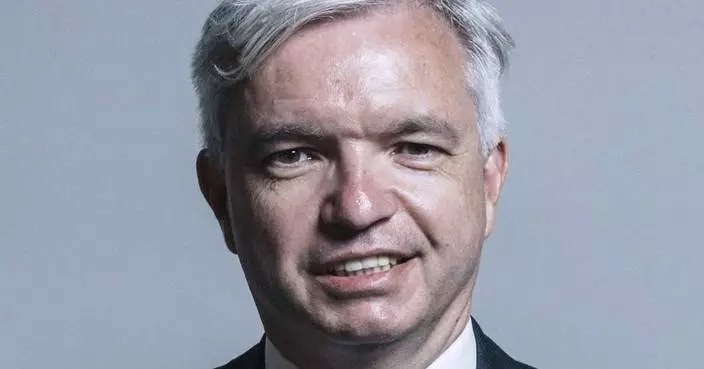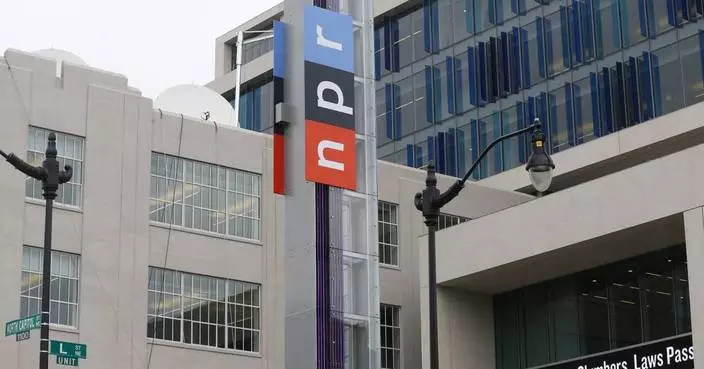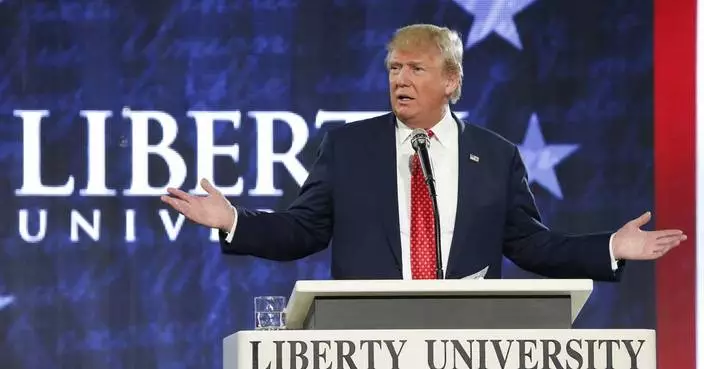Ivan Duque, the young conservative protege of a powerful former president, was elected Colombia's next leader Sunday after promising to roll back a fragile peace accord that has divided the South American nation.
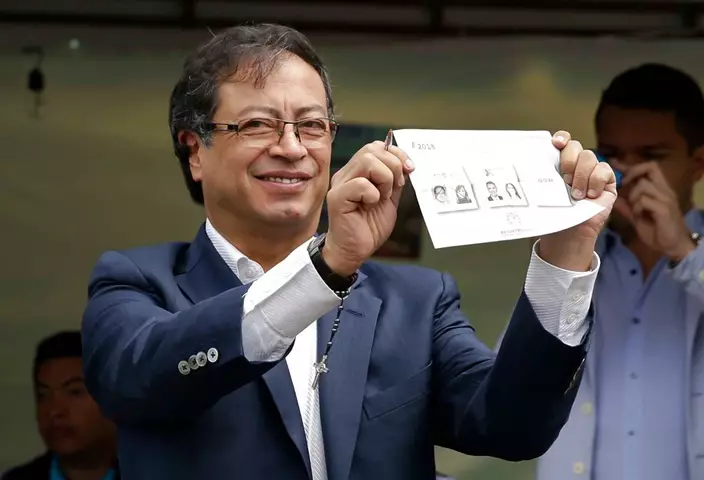
Gustavo Petro, presidential candidate for Colombia Humana, shows his ballot during the presidential election in Bogota, Colombia, Sunday, June 17, 2018. Voters will choose between Petro, a leftist former guerrilla and Ivan Duque, a young conservative lawmaker in a presidential election to decide who will lead Colombia as it implements a still-fragile peace accord. (AP Photo/Martin Mejia)
Duque captured almost 54 percent of the vote, putting him 12 points ahead of former leftist guerrilla Gustavo Petro in a tense runoff election that had appeared to be tightening in recent days.
Click to Gallery
Ivan Duque, the young conservative protege of a powerful former president, was elected Colombia's next leader Sunday after promising to roll back a fragile peace accord that has divided the South American nation.
Duque captured almost 54 percent of the vote, putting him 12 points ahead of former leftist guerrilla Gustavo Petro in a tense runoff election that had appeared to be tightening in recent days.
"The peace we all dream of demands corrections," he told hundreds of jubilant supporters. "So that victims are the true center of the process and so that there is justice, reparations and no repetition."
"Undoubtedly, for the peace process, this is an important test," said Patricia Munoz, a professor of political science at the Pontifical Xavierian University in Bogota.
Petro took his loss in stride, refusing to call it a defeat and saying that "for now" he and his supporters won't form a government — echoing the words used by socialist revolutionary Hugo Chavez following his failed 1992 coup against Venezuela's government. Six years later Chavez was elected president, setting the stage for a surge of the left throughout Latin America.
But the accord remains contentious and Duque pledged throughout his campaign to make changes that would deliver "peace with justice." Through constitutional reform or by decree, he could proceed with proposals such as not allowing ex-combatants behind grave human rights abuses to take political office until they have confessed their war crimes and compensated victims.
In the end, the prematurely graying 41-year-old sailed to victory, promising to change parts of the accord with leftist rebels but not "shred it to pieces" as some of his hawkish allies had been urging.
When he takes office in August, Duque will be Colombia's youngest president in more than a century.
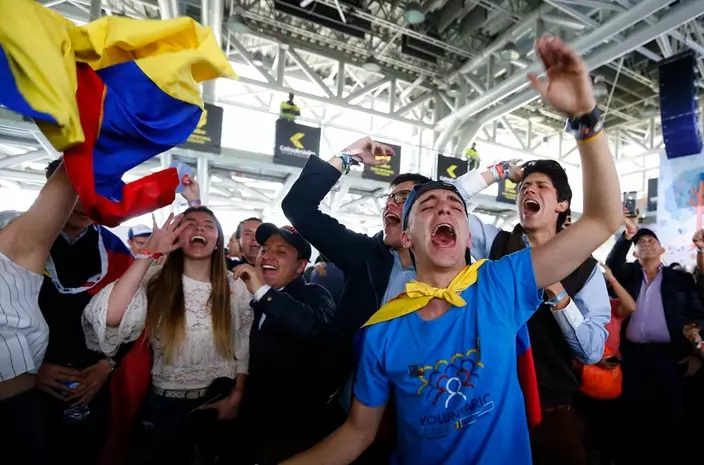
Supporters of Ivan Duque, candidate of the Democratic Centre party, celebrate the incoming results of the presidential runoff election in Bogota, Colombia, Sunday, June 17, 2018. A preliminary count of nearly 85 percent of voting center reports indicates Duque has a lead of 13 percentage points over Petro. (AP Photo/Fernando Vergara)
"The peace we all dream of demands corrections," he told hundreds of jubilant supporters. "So that victims are the true center of the process and so that there is justice, reparations and no repetition."
The new president will inherit a country still scarred by five decades of bloody armed conflict and grappling with soaring cocaine production. Former guerrillas of the Revolutionary Armed Forces of Colombia are struggling to reinsert themselves in civilian life in a nation where many people remain hesitant to forgive. Vast swaths of remote territory remain under the control of violent drug mafias and residual rebel bands.
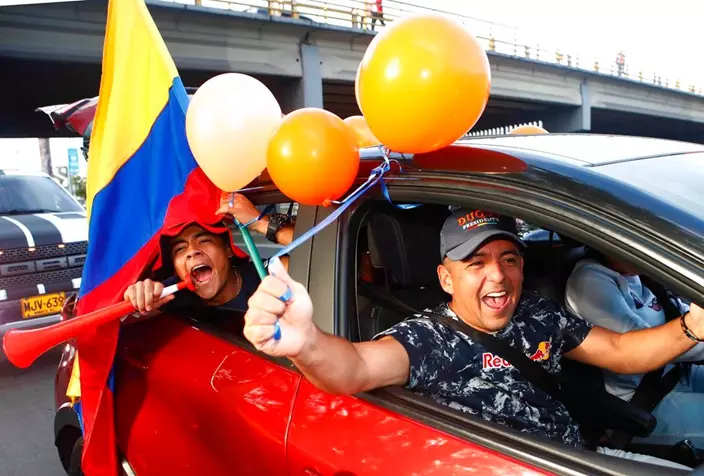
Supporters of Ivan Duque, candidate of the Democratic Centre party, celebrate the incoming results of the presidential runoff election in Bogota, Colombia, Sunday, June 17, 2018. A preliminary count of nearly 85 percent of voting center reports indicates Duque has a lead of 13 percentage points over Petro. (AP Photo/Daniel Munoz)
"Undoubtedly, for the peace process, this is an important test," said Patricia Munoz, a professor of political science at the Pontifical Xavierian University in Bogota.
It was the first presidential election since the signing of the 2016 peace agreement ending Latin America's longest-running conflict and was ultimately just as much about the divisive accord as it was deeply entrenched issues like persistent corruption and high levels of enduring inequality.
Petro energized young voters and drew millions to public plazas with his fiery speeches vowing to improve the lives of poor, disenfranchised Colombians.
And though he failed to catch Duque, his more than 8 million votes marked the biggest ballot box success for a leftist presidential contender yet in a country where leftist politicos have long been stigmatized over fears of potential ties to guerrilla causes.
"Perhaps as time passes people will be less scared about voting for left-wing politicians," said Jorge Gallego, a professor at Colombia's Rosario University. "Although with this result, it's proven that Colombia is still a right-wing country."
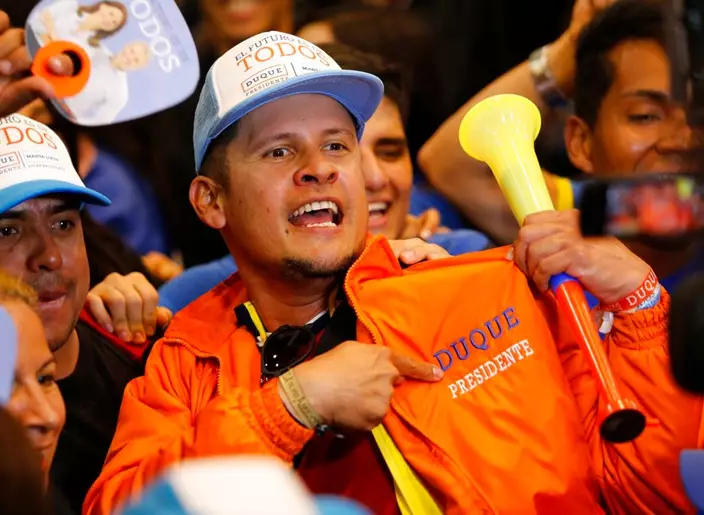
Supporters of Ivan Duque, candidate of the Democratic Centre party, celebrate his victory in the presidential runoff election in Bogota, Colombia, Sunday, June 17, 2018. Duque, the young conservative protege of a powerful former president, was elected Colombia's next leader after promising to roll back a fragile peace accord that has divided the South American nation. (AP Photo/Fernando Vergara)
Petro took his loss in stride, refusing to call it a defeat and saying that "for now" he and his supporters won't form a government — echoing the words used by socialist revolutionary Hugo Chavez following his failed 1992 coup against Venezuela's government. Six years later Chavez was elected president, setting the stage for a surge of the left throughout Latin America.
He challenged Duque to break with his hard-line allies and promised to transform his considerable following into a vocal opposition that would push for social reforms and stand by the peace accord.
"Those eight million Colombians are not going to let Colombia return to war," Petro said to a thunderous applause from supporters chanting "Resistance!"
Colombia's peace process to end a conflict that left more than 250,000 people dead is considered largely irreversible. Most of the more than 7,000 rebels who have surrendered their weapons have started new lives as farmers, community leaders and journalists. Last year the rebels launched a new political party and will soon occupy 10 seats in congress.
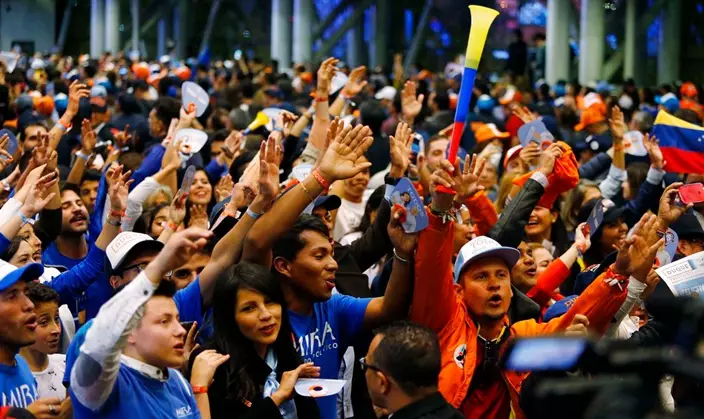
Supporters of Ivan Duque, candidate of the Democratic Centre party, celebrate his victory in the presidential runoff election in Bogota, Colombia, Sunday, June 17, 2018. Duque, the young conservative protege of a powerful former president, was elected Colombia's next leader after promising to roll back a fragile peace accord that has divided the South American nation. (AP Photo/Fernando Vergara)
But the accord remains contentious and Duque pledged throughout his campaign to make changes that would deliver "peace with justice." Through constitutional reform or by decree, he could proceed with proposals such as not allowing ex-combatants behind grave human rights abuses to take political office until they have confessed their war crimes and compensated victims.
The current agreement allows most rebels to avoid jail, a sore point for many.
"The rebels are going to get 10 seats in congress without having made reparations to victims or turned over information on drug trafficking routes," said Felipe Ramirez, 29, a veterinarian who voted for Duque. "That's a bad precedent because other criminal groups will want the same."
Duque's detractors warn that his victory could throw an already delicate peace process into disarray.
"I think it will set up a big constitutional battle," said Cynthia Arnson, director of the Latin America program at the Woodrow Wilson International Center for Scholars.
Duque is the son of a former governor and energy minister who friends say has harbored presidential aspirations since he was a child. The father of three ago entered public service almost two decades as an adviser to then Finance Minister Juan Manuel Santos, whom he will succeed as president.
Duque later moved to Washington, where he spent more than a decade at the Inter-American Development Bank, first as an adviser for three Andean countries and later as chief of the cultural division.
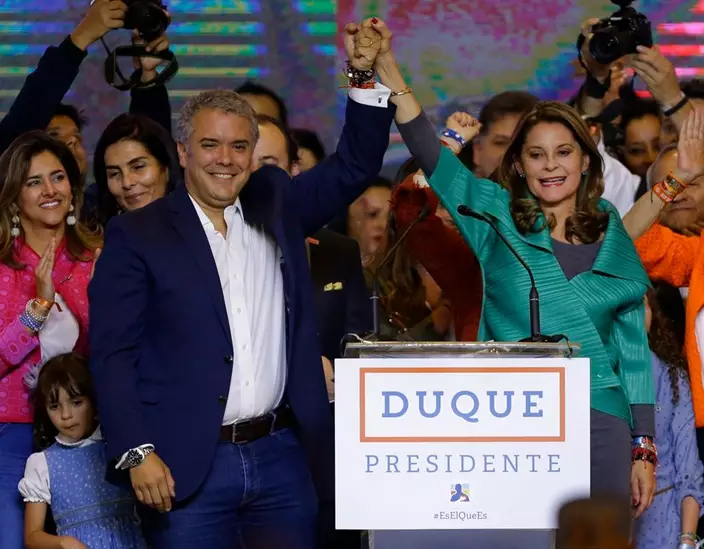
Ivan Duque, left, candidate of the Democratic Centre party, celebrates his victory with his running mate Martha Lucia Ramirez, in the presidential runoff election in Bogota, Colombia, Sunday, June 17, 2018. Duque defeated Gustavo Petro, a former leftist rebel and ex-Bogota mayor. (AP Photo/Fernando Vergara)
It was during that time that Duque forged a close relationship with former President Alvaro Uribe, the torchbearer of conservatives who is both adored and detested by legions of Colombians.
With Uribe's backing, Duque was elected to Colombia's Senate in 2014. Seated beside his mentor in the opulent Senate chamber, Duque earned a reputation as a like-minded security hawk who did his homework and earned the respect of colleagues across the political spectrum.
Throughout his campaign, Duque was dogged with accusations that he would be little more than a puppet for Uribe, who is constitutionally barred from seeking a third term.
Though praised for boosting Colombia's economy and weakening the FARC, Uribe presided over the government at a time when military officers killed thousands of civilians who were then dressed up as rebels to inflate body counts in exchange for vacations and bonus pay.
Critics fear Uribe will use his leverage over his star pupil to retaliate against political enemies and sideline investigations against him and his family for suspected ties to right-wing paramilitaries. Duque's supporters say that he will chart his own course.
In his victory speech, Duque said he would strive to bridge the divisions generated by the peace process and be a president for all Colombians. He added that he wants to see rank-and-file guerrilla members succeed in their transition to civilian life and become part of a growing Colombian economy.
"This is the opportunity that we have been waiting for," he said. "To turn the page on the politics of polarization, insults and venom."
LONDON (AP) — Millions of voters in England cast ballots Thursday in an array of local elections, the last big test before a looming U.K. general election that all indicators suggest will see the Labour Party return to power after 14 years in the wilderness.
Prime Minister Rishi Sunak was barely able to point to any big success for his Conservative Party, confirming that the electoral coalition that gave the party a big win in the 2019 general election has frayed, if not completely dissolved, in the wake of a series of political dramas and the cost of living crisis.
For Labour leader Keir Starmer, the results provided confirmation of what opinion polls have shown for two years — that Labour has recovered from its 2019 low and is on course to win the election comfortably.
Here are five things we learned:
It's possible.
Though the Conservatives lost around half the 1,000 council seats they held, and suffered a huge defeat in the special parliamentary election in Blackpool South, a coastal resort town in the northwest of England, it looks as though Sunak will not face a revolt just yet from anxious lawmakers in his party.
That's largely because the Conservative candidate in the mayoral contest in Tees Valley in the northeast of England hung on, albeit with a much depressed vote. That helped soothe some concerns despite losses elsewhere.
However, the defeat of the Conservative incumbent mayor in the West Midlands could prompt another bout of jitters among lawmakers increasingly concerned about their ability to hold onto their seats in a general election. Sunak is under pressure from different wings of the party to go further right or move to the center.
Overall, the results show that Sunak hasn't improved the Conservatives’ overall position following the damage caused by the actions of his predecessors, Boris Johnson, who was effectively ousted, and then replaced by Liz Truss, whose tenure lasted only 49 days after her economic policies rocked financial markets.
Probably in the fall.
In the U.K., the date of the general election rests in the hands of the prime minister. It has to take place by January, and Sunak has repeatedly said that his “working assumption” was that it would take place in the second half of 2024.
Though that theoretically could take place as soon as July, most Conservative lawmakers have indicated that the best time would be in the fall, when recent tax cuts may register with voters, inflation has fallen further, and interest rates may have been cut — helping to fuel an economic feelgood factor.
Waiting till the fall may also give the government a chance to cut taxes again in another budget. Conservatives will also be hoping that the controversial plan to send some asylum-seekers to Rwanda will have got off the ground and that there is evidence that it is acting as a deterrent for those seeking to make the dangerous crossing in small boats across the English Channel from France to England.
It looks like it.
In historical terms, Labour has a mountain to climb, if it’s going to form the next government. Its performance at the last general election in 2019 was its worst since 1935. Starmer has tried to bring the party back to the center of U.K. politics after the leadership of veteran left-winger Jeremy Corbyn.
Starmer’s approach has clearly worked if Thursday's results are anything to go by. Labour won control of councils in England that the party hasn’t held for decades, and was successful on a massive swing away from the Conservatives in Blackpool South, which if repeated at the general election would lead to a big majority.
Labour won in areas that voted for Britain’s departure from the European Union in 2016 and where it was crushed by Brexit-backer Johnson, such as Hartlepool in the northeast of England, and Thurrock in southeast England. It also seized control of Rushmoor, a leafy and military-heavy council in the south of England where it had never won, showing that it has a broad base of support.
It’s fair to say that enthusiasm levels are far lower than those that heralded the arrival of Labour's Tony Blair before the 1997 general election.
That may be partly because of the more challenging economic backdrop, but Starmer, formerly a human rights lawyer, lacks the razzmatazz of Blair.
It'll be tough.
One of the contributing factors to Blair’s landslide victory in 1997 came from so-called tactical voting, whereby some voters put aside their political preference and vote for whoever has the best chance of defeating the party they oppose the most. In 1997, that was the Conservatives.
Tactical voting has reemerged and was evident somewhat in Thursday's elections where Conservative candidates lost out to other parties, not just Labour, but also to the centrist Liberal Democrats and also to the Green Party.
The Conservatives may also be outflanked from the right, with Reform U.K. poised to stand candidates across Britain. In Thursday's elections, it was a minimal presence but where the party did stand, it clearly took votes away from Conservative candidates. That was notable in Blackpool South, where the Reform candidate was just shy of usurping the Conservatives into second.
Should Reform, which claims to be tougher on issues such as immigration and on Brexit, do as well in a general election, then it could lead to other parties, notably Labour, defeating Conservatives.
It certainly looks like it.
In some areas with large Muslim populations, such as Blackburn and Oldham in northwest England, Labour candidates appear to have suffered as a result of the leadership’s strongly pro-Israel stance over the conflict in Gaza.
Labour's vote share was clearly impacted, but the effect on its performance in a general election remains unclear, as those seats with a big Muslim population generally have big Labour majorities.
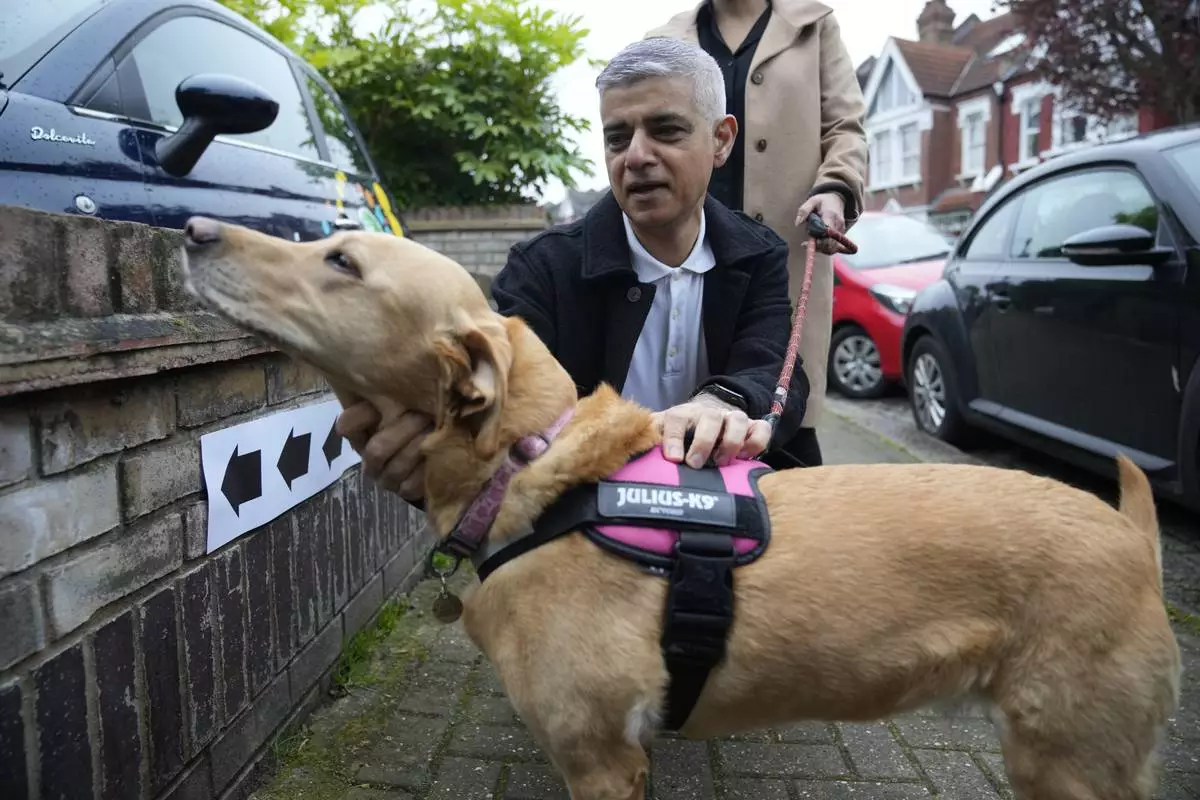
London Mayoral Labour Party candidate Sadiq Khan pats his dog Luna as they pose for the media he arrives to vote in London, Thursday, May 2, 2024. Khan, is seeking re-election, and standing against 12 other candidates for the post of Mayor of London. There are other Mayoral elections in English cities and as well as local council elections. (AP Photo/Kin Cheung)
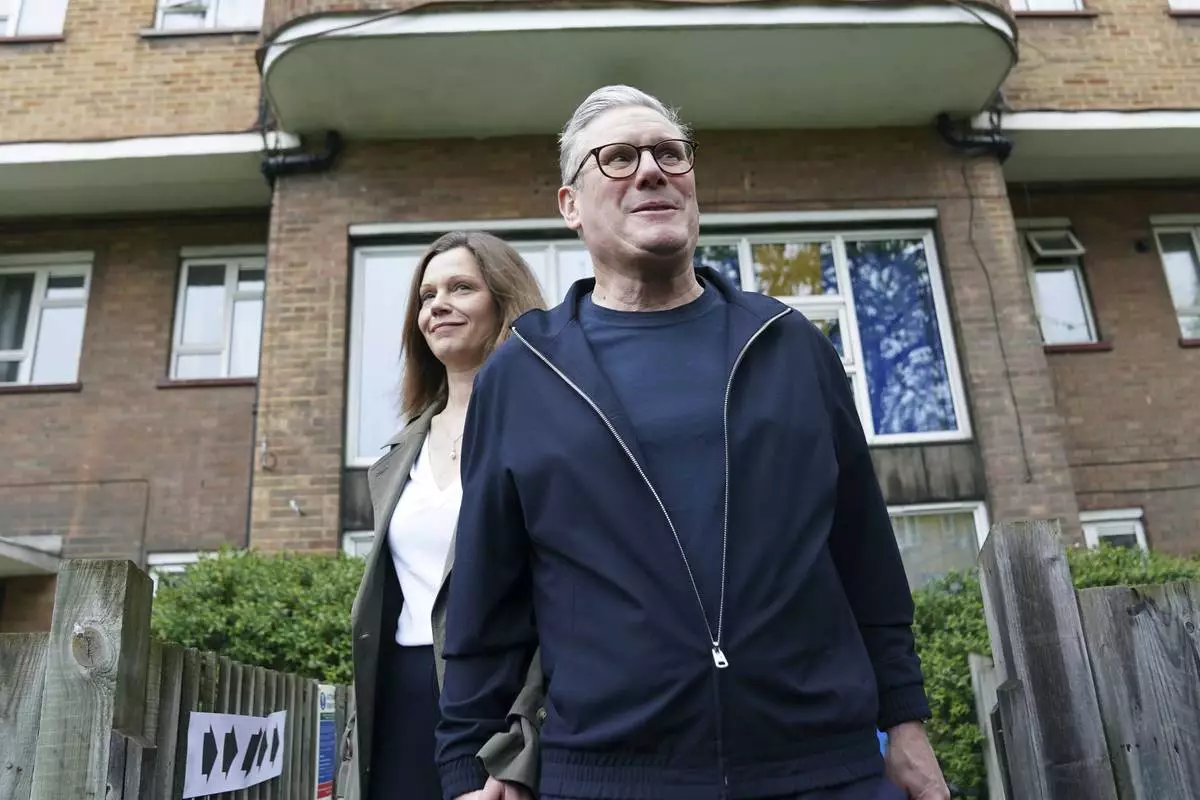
Britain's Labour leader Keir Starmer and his wife Victoria leave the polling station in his Holborn and St Pancras constituency, after casting their votes in the local and London Mayoral election, in north London, Thursday May 2, 2024. (Stefan Rousseau/PA via AP)
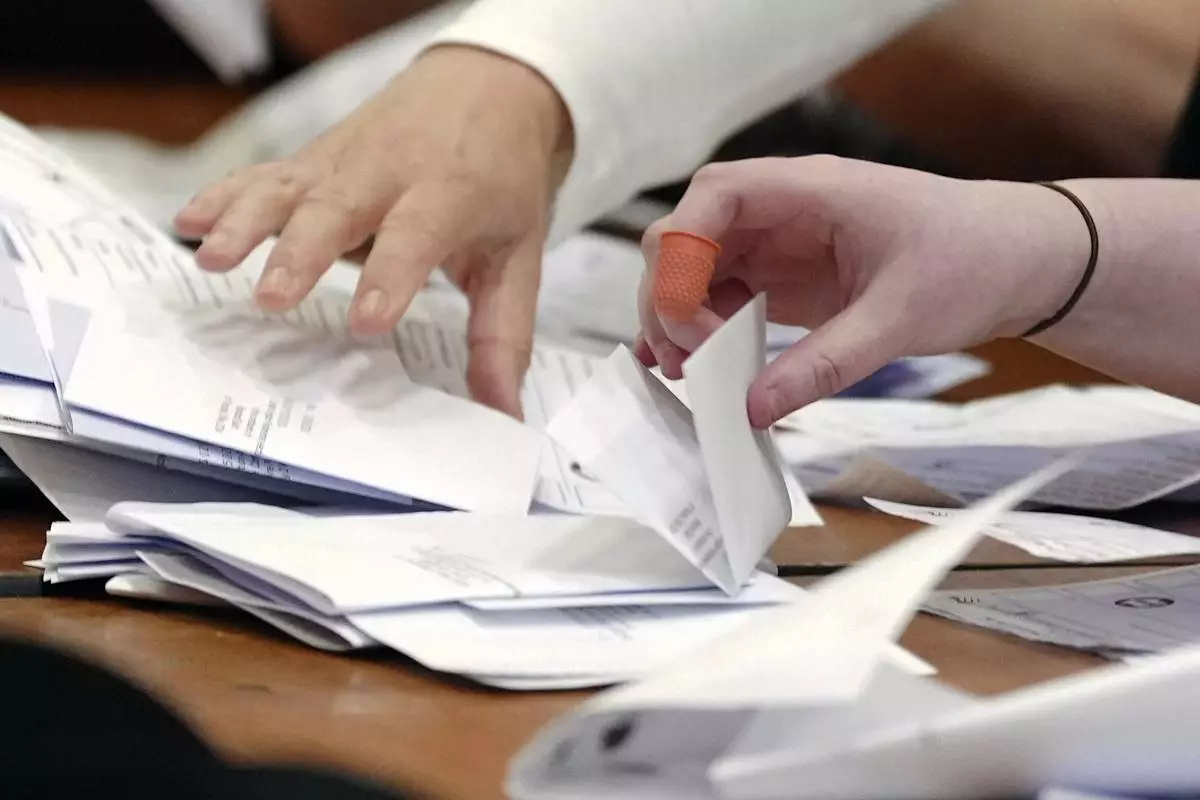
Counting begins at the Blackpool South by-election at Blackpool Sports Centre in Blackpool, England, Thursday, May 2, 2024. The by-election was triggered after the resignation of Scott Benton. (Peter Byrne/PA via AP)
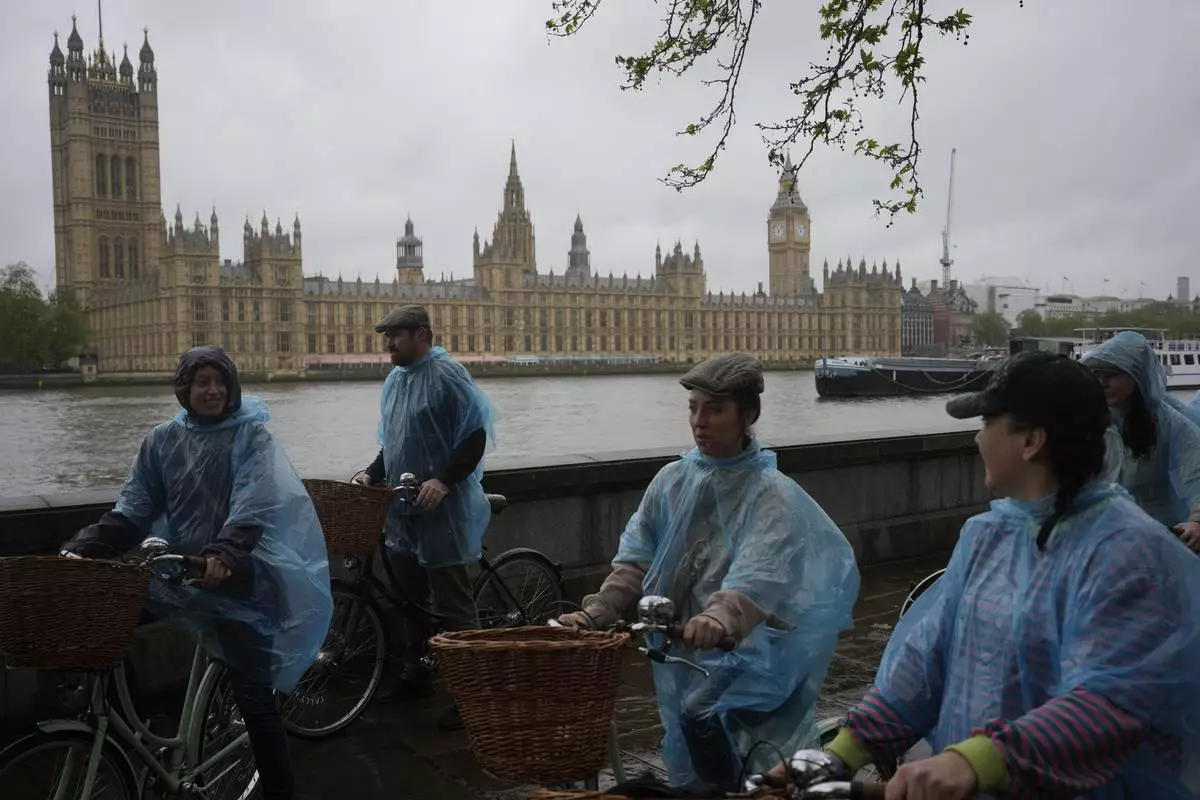
Tourists on a cycle tour in wet weather plastic macs, cycle past the Houses of Parliament, in London Friday, May 3, 2024. Britain's governing Conservative Party is suffering heavy losses as local election results pour in Friday, piling pressure on Prime Minister Rishi Sunak ahead of a U.K. general election in which the main opposition Labour Party appears increasingly likely to return to power after 14 years. (AP Photo/Kin Cheung)
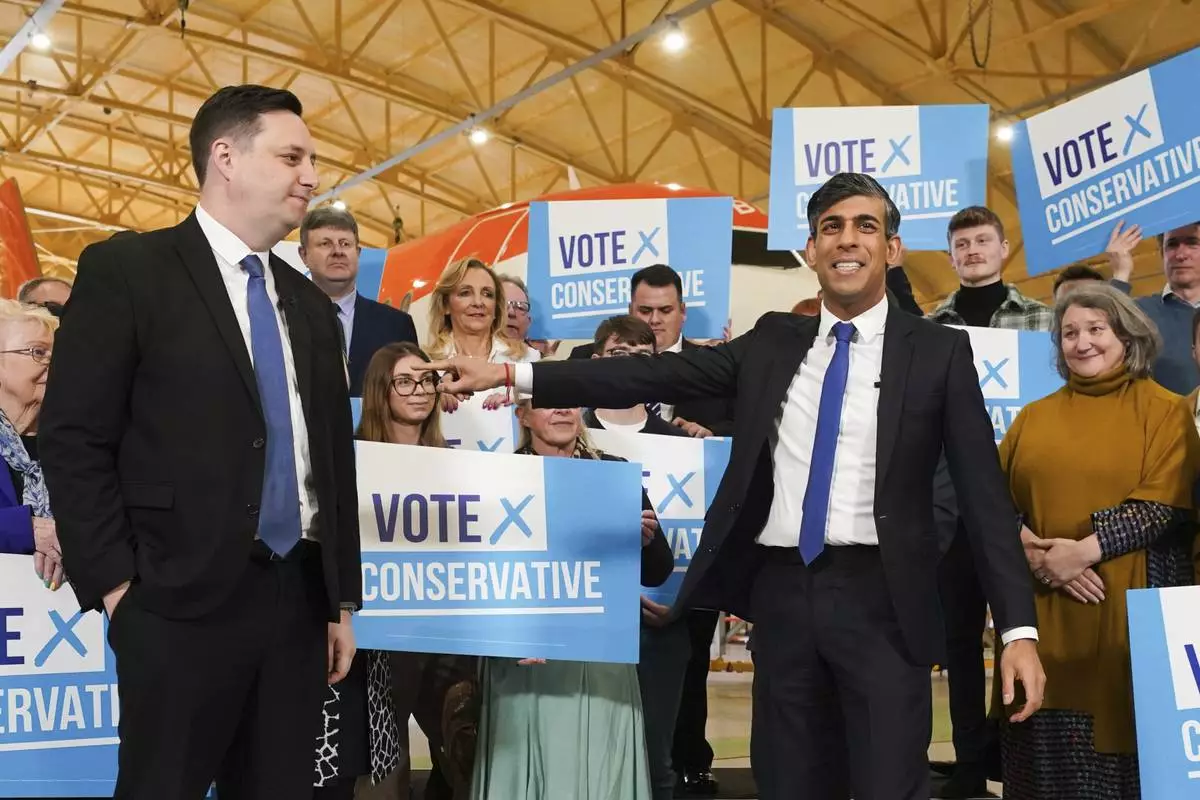
Conservative party candidate Lord Ben Houchen, left, with Britain's Prime Minister Rishi Sunak following his re-election as Tees Valley Mayor in Teesside, England, Friday May 3, 2024. (Owen Humphreys/PA via AP)
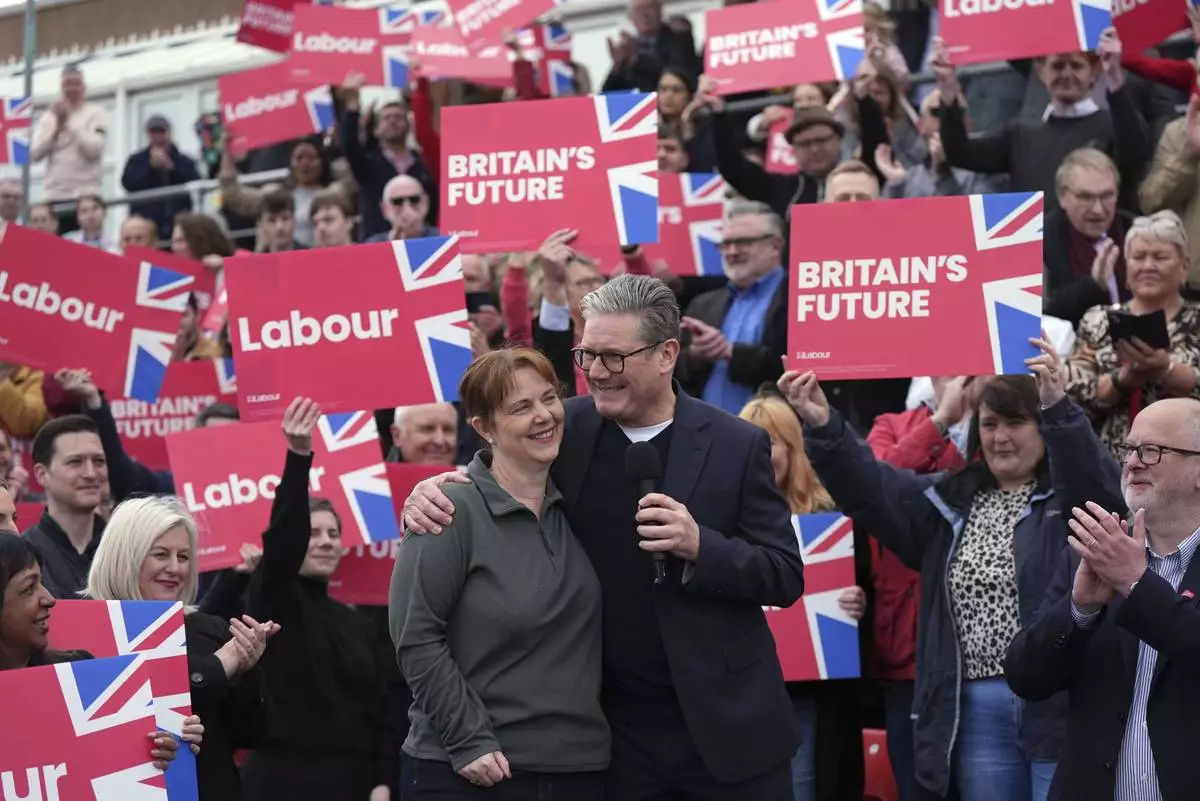
Britain's Labour Party leader Sir Keir Starmer with newly elected East Midlands mayor Claire Ward during a visit to Forest Town Arena in Mansfield, England, Saturday May 4, 2024. (Jacob King/PA via AP)
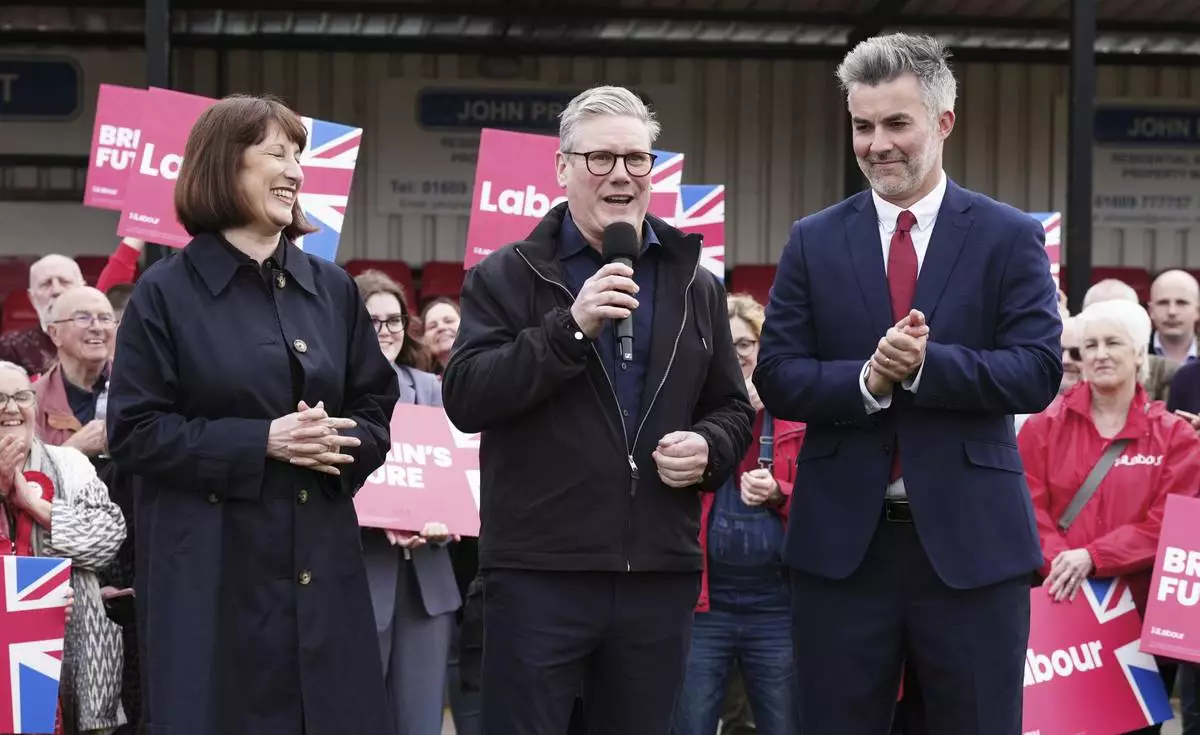
Britain's Labour Party leader Sir Keir Starmer, center, and shadow chancellor Rachel Reeves, celebrate with David Skaith at Northallerton Town Football Club, North Yorkshire, after winning the York and North Yorkshire mayoral election, Friday May 3, 2024. (Owen Humphreys/PA via AP)
















